Colin Scott died in Yellowstone National Park last week after stepping off the boardwalks and falling into a hot spring. His death follows a string of recent news articles involving tourists breaking rules in Yellowstone, either by getting too close to animals or leaving marked pathways.
Each incident invokes the same sanctimonious reactions: “Stupid tourist!/I’m sorry, but…/I would never!”
Unlike another young man in the news due to “twenty minutes of action,” Colin Scott does not deserve the public derision aimed at him.
Colin Scott’s death is a tragedy. Yes, it is important to heed warnings put in place for our own safety and for protection of Yellowstone. Colin Scott took a risk, presumably to get closer to a hot spring, broke park rules, and paid the ultimate price. Many of us have made risky decisions in our lives, especially in our teens and early twenties. Smart people have done stupid things. Good people have done bad things.
According to the National Park Service, four million people visit Yellowstone each year. The vast majority of visitors obey warning signs, stay on the path, and don’t get too close to the animals. Inevitably, a few make the news after a bison selfie leads to a hospital visit.
Since the first recorded fatality in 1890, twenty-two people have died after falling into thermals (about one every six years). The last recorded fatality due to thermals occurred in 2000, so the park was actually on a pretty good run.
This article is a plea for compassion and a call to move past the tropes that follow incidents like this. The following comments are typical reactions to any Yellowstone incident:
1. The “I’m sorry, but…”
These told-you-so posts are often disguised as public service announcements.
In Game of Thrones, Benjen Stark states: “Nothing someone says before the word ‘but’ really counts.”
2. The “stupid tourists!”
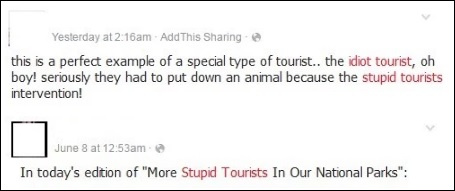
Nothing makes locals feel better about themselves than making fun of tourists.
3. The “I went there and I stayed on the path”
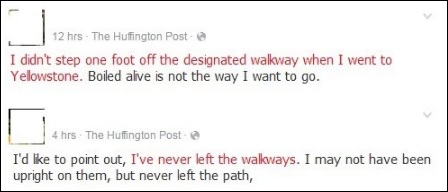
These holier-than-thou folks would never break a rule.
4. The “why are people dumber than ever?”
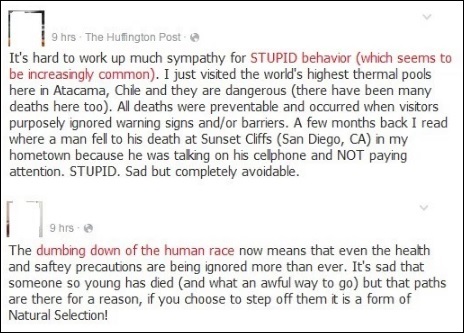
From 1931-1969, there were an average of 48 bear-inflicted injuries per year in Yellowstone because people used to feed them from their cars.
5. The “name-calling”
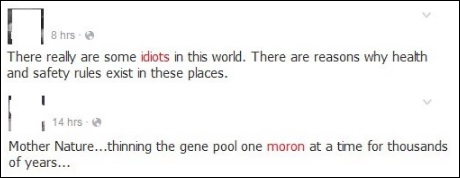
Everyone makes mistakes. Except these Facebook users.
6. The “Yellowstone will get closed!”
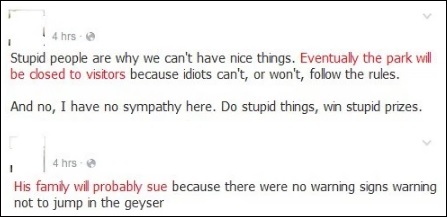
Nobody is arguing the park should be closed. And no, you cannot win a lawsuit against the park if you leave the paths and fall in a geyser.
7. The “don’t you understand that Yellowstone is WILD?!”
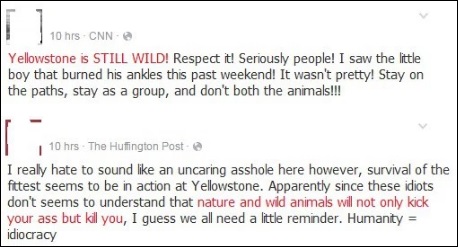
Bison appear deceptively docile up close. If you live or grew up near Yellowstone, you probably know better. As a tourist, you might not.
8. The “have respect for nature”
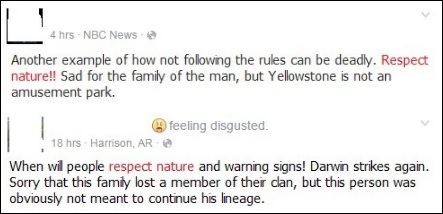
What about respect for the dead?
9. The “Darwin Award”
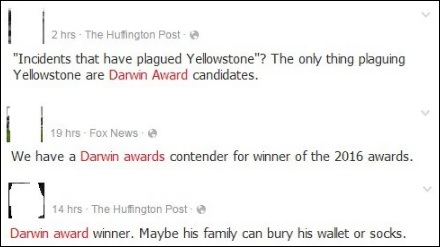
And more…
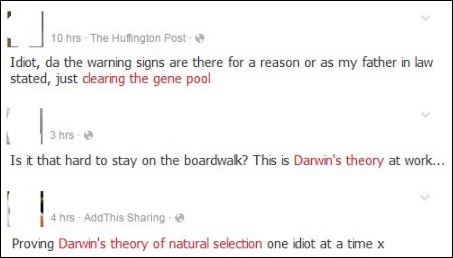
And more…
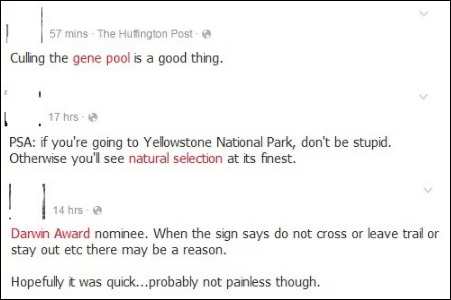
Everyone knows at least one person who invoked the Darwin Awards, improving the gene pool, natural selection, or survival of the fittest.
Bonus:
The “dumb tourists killed a baby bison!”
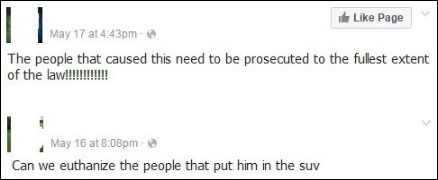
In May, reactions to the death of a bison calf stormed our Facebook home feeds (at least if you’re from Montana). Some well-meaning, but misguided tourists put the calf in the back of their SUV and dropped it off at a park service office. The calf had been approaching people and the tourists thought it was cold. The calf was euthanized after park rangers were unable to reunite it with its herd. It later turned out that the calf had been abandoned from its herd prior to its contact with humans.
According to the National Park Services, 20-40 percent of bison calves die in the first year. Death of a bison calf is sad, but not particularly unusual. We also eat 60,000 bison each year.
Plea for Compassion
While there seem to have been an unusually high number of tourist incidents in Yellowstone this year, remember that headlines are not trend lines. A few accidents among millions of visitors should be expected. “Dumb tourists” are people with families, personalities, and aspirations.
Park safety is an important message that can prevent future tragedies. Let us aspire to deliver the message with kindness and have sympathy when warnings fail and tragedy strikes.
The following two tabs change content below.


I am Sterling, one of the Two Fish Traveling. I love to travel and live in Polson, Montana with my wife Sarah.
Latest posts by Sterling Laudon (see all)
- How to Hike the Top of the Chinese Wall in the Bob Marshall Wilderness - March 28, 2023
- All of the bad things that happen when you travel - October 14, 2019
- Favorite countries of long-term travelers - August 8, 2019




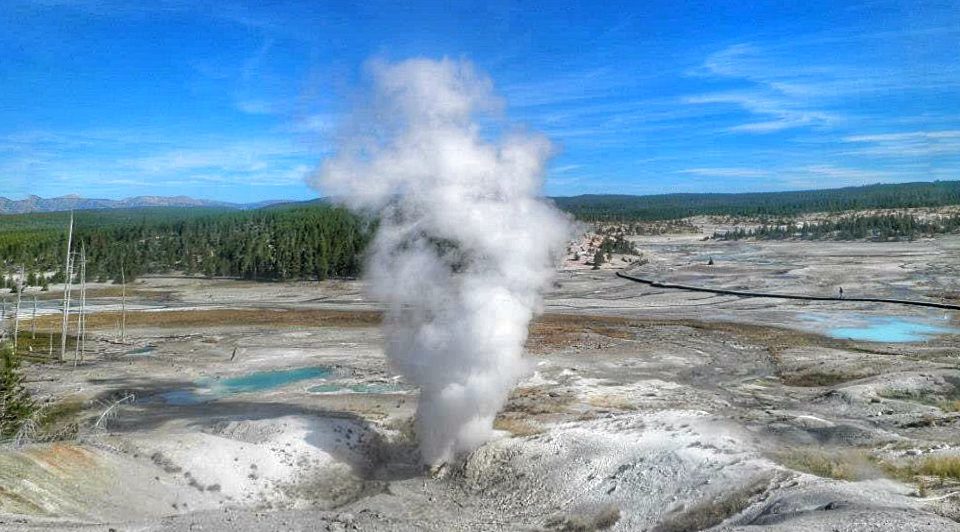
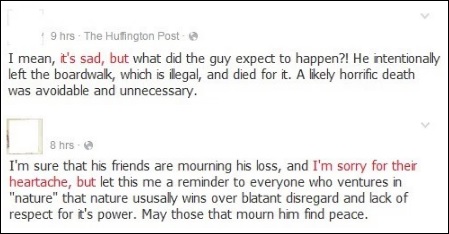


“And no, you cannot win a lawsuit against the park if you leave the paths and fall in a geyser.” Not sure where you got that idea, but it is eerroneous. Several people have won lawsuits against NPS for these kinds of things, including most notably Andy Hecht’s family (look it up). “Bison appear deceptively docile up close. If you live or grew up near Yellowstone, you probably know better. As a tourist, you might not.” The park hands out a huge yellow sheet with warnings about the dangers animals pose (and the regulations that require you to remain a… Read more »
Hi Matt, Thanks for the feedback! With regards to the lawsuits, I could have been more clear. You cannot win a lawsuit if you purposely leave the pathways, as opposed to accidentally such as in the Hecht case. Regarding the bison, I don’t mean to make excuses. My point is that the danger may be less obvious to tourists than to locals. Even after receiving warnings, there are probably lots of tourists who haven’t heard the stories about injuries. Bison do appear sort of cow-like up close, eating grass and not moving much. I could see how that appearance might… Read more »